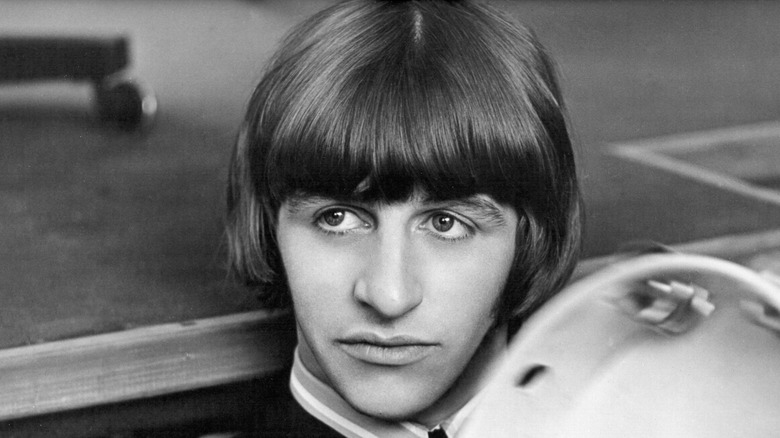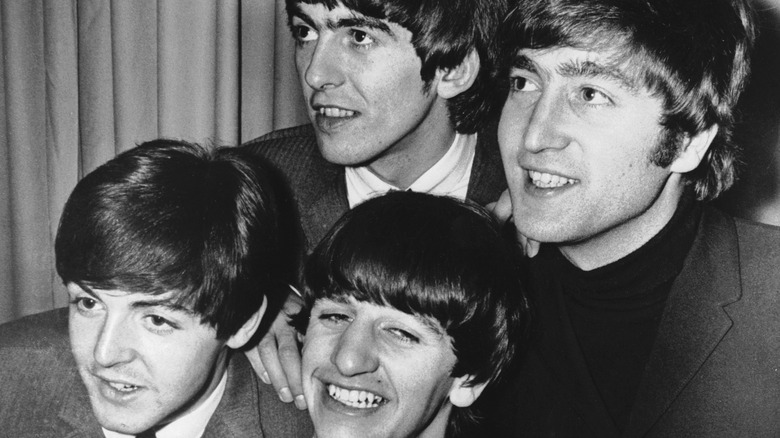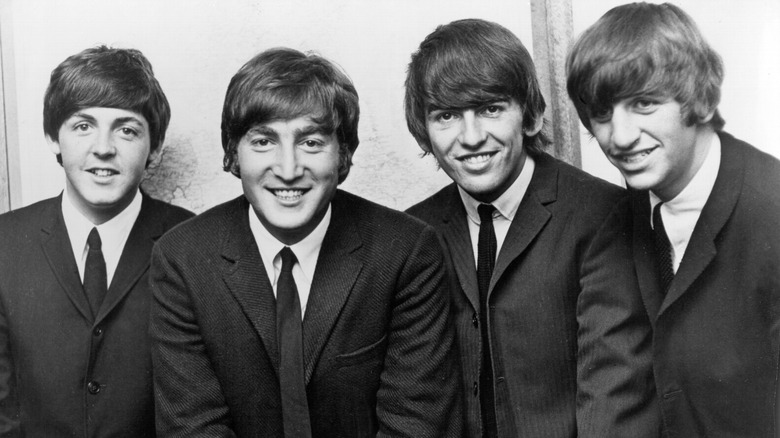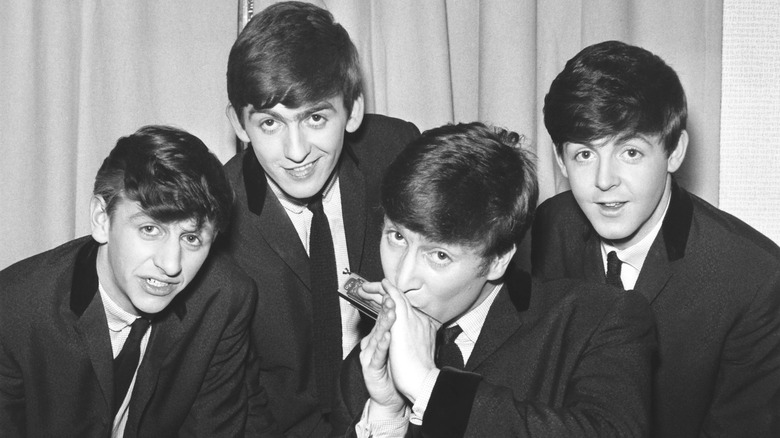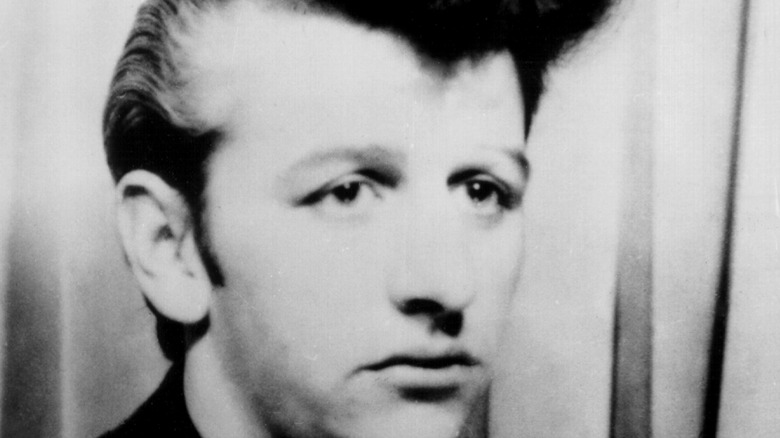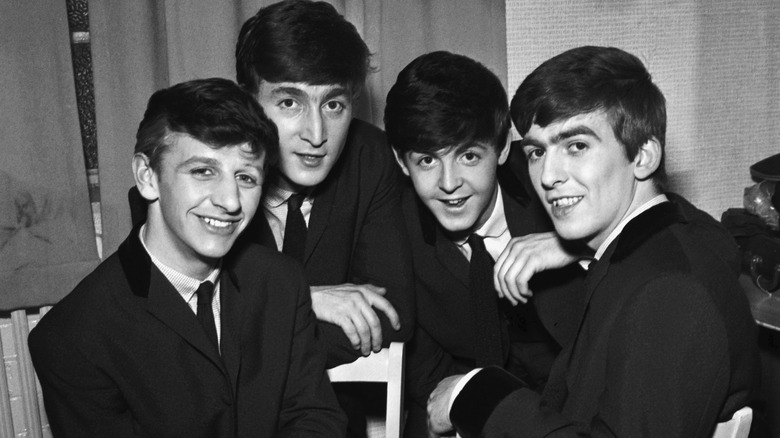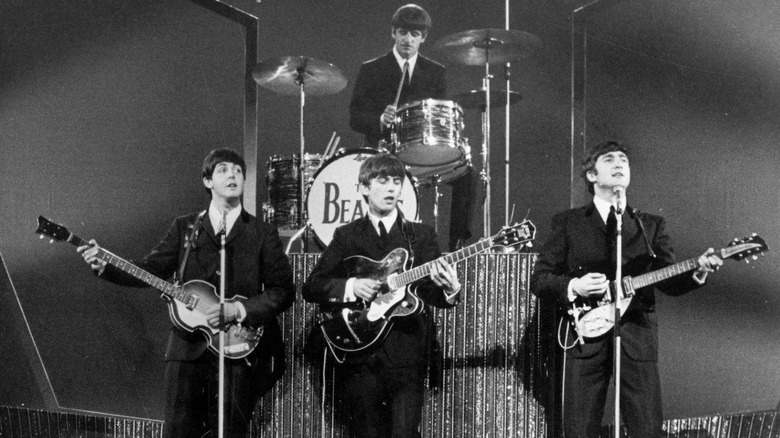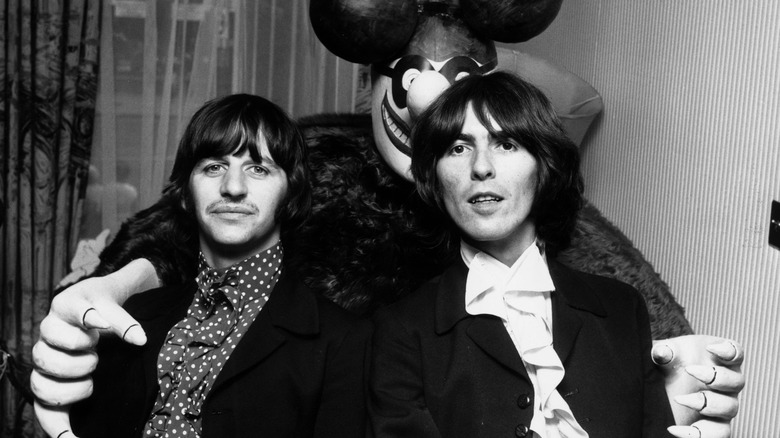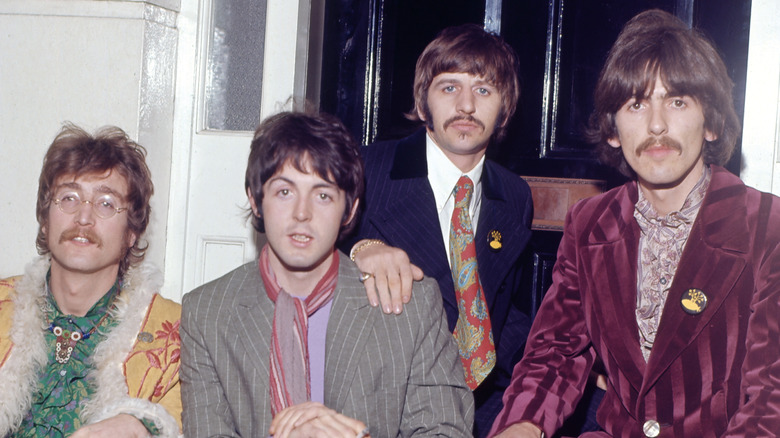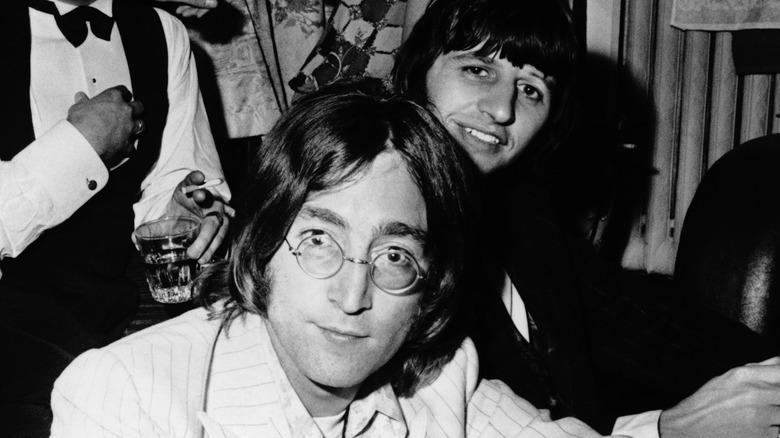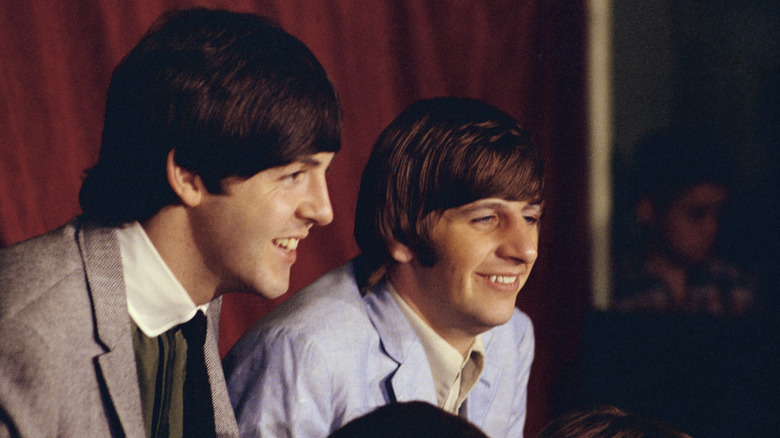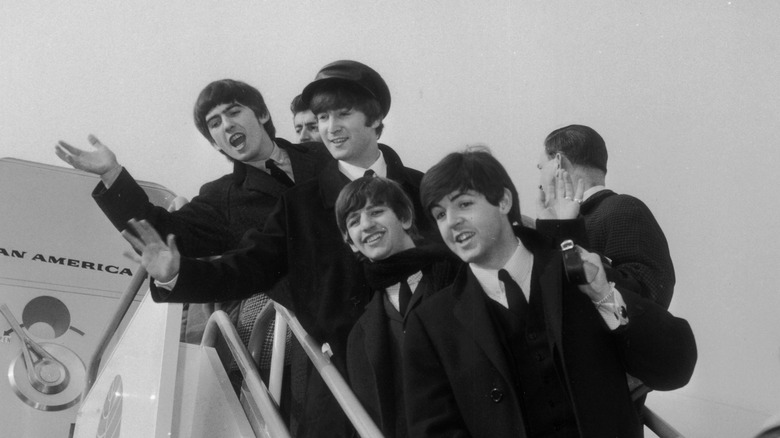Ringo Starr Sang Lead Vocals On 11 Beatles Songs. Here's The Story About Each Of Them
Though the names John, Paul, George, and Ringo have been inseparable in the popular consciousness for nearly 60 years, The Beatles didn't quite start out as the Fab Four as we know them today.
In the early days, the Beatles' rhythm was kept by Pete Best, a renowned drummer whose good looks made him the star of the show of the band's early gigs in the North West of England and Hamburg, Germany. Best sang a number of songs during the Beatles' early days, and even had his own dance act in the show while Paul McCartney filled in on drums (via The Beatles Bible). However, after drifting apart from his fellow band members he was replaced by Ringo Starr, who was poached from fellow Merseybeat group Rory Storm and the Hurricanes.
Surprisingly, when the group finally got a recording contract through the efforts of their manager Brian Epstein, and began making their first recordings with veteran producer George Martin, Ringo found himself out of favor. According to Ringo's biographer Alan Clayson, Martin initially didn't think the drummer was solid enough for studio playing. However, Ringo eventually won the producer round, and not only did he drum on the vast majority of Beatles songs thereafter, but he was also even given his own traditional spot on lead vocals on each studio album. Why? Well, like Best, Ringo was many fans' favorite Beatle, and the band wanted to give the fans what they desired, according to the CBC.
Here are all 11 Beatles songs that Ringo sang, and how they came into being.
Boys
Ringo Starr's first lead vocal came on the band's debut album, 1963's "Please Please Me." The album was rush recorded in a single day to capitalize on the group's explosion in popularity (via "Ringo Starr: Straight Man or Joker?"). The record was a combination of the singles released up until that point, new originals written by John Lennon and Paul McCartney, as well as an array of cover songs that the group had been playing live since their early days on the club circuit in Liverpool and Hamburg.
"Boys" is a cover of a song by the popular girl group The Shirelles, which was written by Luther Dixon and Wes Ferrell. Previously a fixture of the band's live performances and originally sung by Pete Best, Ringo's studio version required only one take, indicating both the pressure the band and producer George Martin were under to get the album in the can in a single day, as well as how familiar The Beatles were with the song (via "Revolution in the Head").
Though he was the last of the Fab Four to join the group, Ringo also knew "Boys" well having performed it before he joined The Beatles with his previous group, Rory Storm and the Hurricanes, according to Starr's biographer Alan Clayson. Per the same source, Martin was just as unenthused with Ringo's voice as he was with his drumming prior to him nailing his version of "Boys," but the cut offers an energetic glimpse of the band's stage act, and perfectly fulfilled the producer's brief.
I Wanna Be Your Man
The Beatles had been playing "Boys" in their live shows for several years before it was committed to wax on Side B of their debut album "Please Please Me." And though the popularity of the song was, if anything, growing as a result of it being the only vocal performance by their fan favorite drummer, the other members of the band were reportedly beginning to tire of it. Paul McCartney has claimed that part of their annoyance with the song was that they had decided not to change the lyrics to have Ringo sing about girls, and that the song was growing "embarrassing" (via The Beatles Anthology).
When it came time to write and record their sophomore U.K. album, "With The Beatles," John Lennon and Paul McCartney made a concerted effort to pen a new song for Ringo Starr that could replace "Boys." That song was "I Wanna Be Your Man."
However, as John Lennon recalled in "The Beatles Anthology," it was in the aftermath of having written Ringo's new tune that The Beatles made the acquaintance of up-and-coming rockers The Rolling Stones, who asked if the world's hottest songwriting duo had a song they would be willing to give them. Lennon and McCartney decided that, though Ringo was soon due to record his version for the upcoming Beatles album, "I Wanna Be Your Man" would be a good fit for Mick Jagger's group. It became their first major hit only a few weeks after Ringo recorded his album version.
Matchbox
Cementing Ringo Starr's reputation as a reliable interpreter of stomping rockabilly numbers, the next Beatles track the drummer took lead vocal duties on was "Matchbox," a cover version of a 1957 song by rock pioneer Carl Perkins.
Perkins was a major touchstone for The Beatles, with Beatles scholar Ian MacDonald claiming in his book "Revolution in the Head: The Beatles' Records and the Sixties" that the Fab Four played 12 of his songs in their live shows before the release of their debut studio album. Nevertheless, the awarding of another familiar cover version to Ringo wasn't exactly a show of respect for the drummer's vocal abilities, something that John Lennon openly admitted. "We weren't going to give him anything great," the songwriter said, according to Alan Clayson's biography: "Ringo Starr: Straight Man or Joker?" In the U.K., the song was hidden away as the final track on the group's 1964 "Long Tall Sally" EP, however, it was released in the U.S. as a single, while Ringo had the honor of Perkins, who was visiting the U.K. at the time, dropping in during the session to witness the recording, per Mark Lewisohn.
Per Alan Clayson, Ringo would later share the stage with Perkins himself, performing "Matchbox" with Perkins, George Harrison, and Eric Clapton on 1985's "Carl Perkins and Friends: A Rockabilly Session," which was broadcast on British TV.
Honey Don't
By the mid-'60s, Ringo Starr had certainly been pigeonholed as being suited to singing a certain kind of rockabilly song. "Honey Don't" is another Carl Perkins number, which this time appeared on the 1964 album "Beatles For Sale," as per Britannica.
And like "Boys," "Honey Don't" was familiar to Ringo from his musical career prior to joining The Beatles. Rory Storm and the Hurricanes reportedly played this song as part of their live shows too, with Ringo taking on vocal duties as part of his own feature spot during each set. According to "The Beatles Anthology," Ringo recalled that "every band in Liverpool" played the song, and because the track was so familiar it made for an easy and straightforward recording session when it came to recording it for the album.
The song was another that had previously been the territory of original drummer Pete Best, though initially John Lennon had taken over on vocal duties before the band realized that it would make for a suitable Ringo-led album track, according to Mark Lewisohn. Per "Ringo Starr: Straight Man or Joker?" both "Honey Don't" and "Matchbox" would later feature in Lennon's solo work as he revisited his rock 'n' roll influences.
Act Naturally
Ringo Starr's persona and vocal style seemed far more suited to sweet and buoyant songs than John Lennon's did. But while the drummer tended to be assigned rock 'n' roll covers to sing when it came to his once-per-album vocal feature, by the time it came to the recording sessions for The Beatles' 1965 smash album "Help!" Ringo was looking to have a greater influence on the choice of songs to which he lent his voice.
As he recalled in "The Beatles Anthology," Ringo discovered "Act Naturally" on a record by country music star Buck Owens, and brought it to his bandmates telling them that he believed it was the perfect song for his spot on the new album. They agreed.
Per "Revolution in the Head," the song was the first cover version The Beatles recorded which they hadn't perfected first live in concert. It would subsequently be the last proper cover song they recorded together and released on an album, with the exception for their rendition of a segment of the traditional song "Maggie May" in the "Abbey Road" medley in 1969.
What Goes On
The story of how The Beatles' power struggles eventually contributed to the break-up of the group in 1970 has been well documented and told numerous times, including in Peter Jackson's critically-acclaimed documentary series, "The Beatles: Get Back." But while the mutually-mop-topped Fab Four looked to the outside world like an unbreakable unit in the mid-1960s, the fact was that tensions were already surfacing within the band, and, surprisingly, these tensions revolved around Ringo.
As Alan Clayson describes in "Ringo Starr: Straight Man or Joker?" the respected drummer whom The Beatles had once poached from their rivals Rory Storm and the Hurricanes felt in the run-up to 1965's "Rubber Soul" that he was being sidelined from the group. As well as primary songwriters John Lennon and Paul McCartney effectively managed creative control of the group, the two along with George Harrison were collaborating with other musicians and starting to compose music in which Ringo felt he was disposable.
As a result, Ringo took his concerns to the band, who assuaged him with his first songwriting credit on a Beatles record (though "What Goes On" was an old song of Lennon's which the band revisited). As noted by Ian MacDonald, the result echoes "Act Naturally" in its laid-back style, with Ringo's songwriting contributions assumed to be lyrical.
Yellow Submarine
One of the most memorable songs of the psychedelic '60s, "Yellow Submarine" is arguably also Ringo Starr's most starring moment in his Beatles career. Unlike more hard-edged rockers like The Rolling Stones and Them, The Beatles had a broad audience and, generally, a family-friendly appeal that they were willing to embrace. Per "Ringo Starr: Straight Man or Joker?," "Yellow Submarine" was conceived as a song that would appeal primarily to children, while also recalling the band's roots in Liverpool, which is a major port city.
Included on the 1966 "Revolver" album, "Yellow Submarine" was also a hit single on both sides of the Atlantic, charting at No. 1 in the U.K. and No. 2 in the U.S. (via The Beatles Bible). At the time, the public perception of the Fab Four had been marred in the U.S. due to John Lennon's infamous claim that the band was "bigger than Jesus," which critics argue likely damaged the single's performance in the American market.
According to Ian MacDonald's "Revolution in the Head," the song was primarily Paul McCartney's creation, though he also had uncredited help from folk singer and friend of the band Donovan, who reportedly contributed to the far-out lyrics.
With A Little Help From My Friends
"With A Little Help From My Friends" is arguably Ringo Starr's signature song, the reflection of his role as mediator and social glue in The Beatles in their toughest moments. The song is still a highlight of Ringo's concerts with his All Starr Band even today.
However, it is also arguable that "With A Little Help From My Friends" technically isn't a Beatles song at all. The song was the second track of 1967's "Sgt. Pepper's Lonely Hearts Club Band," a concept album that begins with the Fab Four taking on the guise of the titular band on the opening track before introducing the character Billy Shears to sing track two, as noted in "The Beatles Anthology."
As Ringo notes per the same source, he is taking on the character of Shears in the song. Though the first two songs of "Sgt. Pepper's" suggest a conceptual unity to the album, nothing else after "With A Little Help From My Friends" really contributes to it. As described by Barry Miles in "The Beatles: The Authorized Biography," the song was specially written for Ringo by Lennon and McCartney, who fittingly pieced it together at a piano in front of a small audience of friends. Ian MacDonald has praised Ringo's charming vocal performance and credits its communal message and Joe Cocker's hit cover version for helping to transform the song into a counterculture hit.
Don't Pass Me By
Though Ringo Starr isn't famous for his songwriting, the music and lyrics for "Don't Pass Me By," his first solo composition on a Beatles record, came to him smoothly and naturally, he explains in "The Beatles Anthology." "I was sitting round at home," he said. "I only play three chords on the guitar and three on the piano. I was fiddling with the piano – I just bang away – and then if a melody comes and some words, I just have to keep going. That's how it happened."
According to The Beatles Bible, Ringo wrote the simple country-and-western-style song early in his Beatles career, and it was alluded to as early as 1964, though it would take until 1968's "The Beatles" (aka "The White Album") for the track to see the light of day. It is tempting to imagine that John Lennon and Paul McCartney might have refused to record "Don't Pass Me By" out of the desire to protect their own egos, or else that they believed the song wasn't good enough.
However, according to Alan Clayson, there was one very solid reason for "Don't Pass Me By" getting a pass for so many years: In writing it, Starr had unconsciously plagiarized the music of a Jerry Lee Lewis song. It was only in the final years of The Beatles' career when they and producer George Martin were experimenting with orchestration and studio effects that the original song was unrecognizable.
Good Night
"Good Night" in many ways sounds like no other song The Beatles ever recorded. The grand finale of "The Beatles" or "The White Album," it is a sweet and tender lullaby rendered into an epic through cinematic orchestration. As Ian MacDonald notes in "Revolution in the Head," "Good Night" was penned by John Lennon as a bedtime song for his son Julian, who was five years old at the time.
According to Rolling Stone, Lennon was evasive in explaining his intentions behind the song. He was adamant that Ringo should sing the piece instead of him, perhaps feeling that Starr was a more cuddly presence on what is essentially a children's song; Lennon had also shown his sensitive side on the album on the ballad "Julia," a track for his deceased mother, and may have felt singing another sweet song for his son would have left him emotionally exposed.
The song is a strange one in The Beatles' catalog as no other Beatle apart from Ringo performs on it, with the music played by session classical musicians directed by George Martin. As MacDonald notes, Ringo's soulful vocal performance and the sweeping instrumentation mean that listeners often suppose the song to be a McCartney piece, akin to the knowing style of "Martha My Dear" and "Honey Pie."
Octopus's Garden
Ringo Starr's second and last composition for The Beatles, "Octopus's Garden" is seemingly an intentional cousin of the hit Ringo-led single "Yellow Submarine." This family-friendly, joyful, and willfully silly number appeared on 1969's "Abbey Road," the last album the group would record together (though the previously-recorded "Let It Be" would effectively be the Fab Four's swan song in 1970). But while the song's "Little Mermaid"-esque lyrics of happiness and freedom under the sea paint a utopian vision, the fact is that "Octopus's Garden" was composed during a period of great turmoil.
Most accounts of The Beatles break-up focus on the respective private and public walkouts from the group by John Lennon and Paul McCartney. But in truth, Starr was the first Beatle to quit the band, storming out of the "The Beatles" sessions as his anger at an increasingly controlling McCartney — who had openly insulted Ringo's drumming — hit an all-time high (via "Ringo Starr: Straight Man or Joker?").
Per Ian MacDonald, Ringo fled London entirely for several weeks, and basked in the sun of the Italian island of Sardinia, where, relaxing by the ocean, he became deeply interested in the seabed behavior of sea creatures, and, suggests MacDonald, may have envied them for their seemingly carefree lifestyles. On his return to the band at Abbey Road studios — where he found his drum kit bedecked with flowers as a gift from his apologetic bandmates (via The Current) — Ringo introduced the song to his fellow Beatles, and worked with George Harrison to get it into shape for recording.
